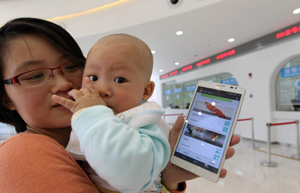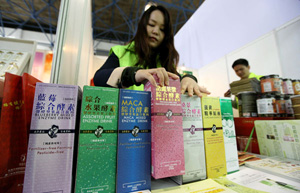Ustar Biotechnologies Ltd, a molecular diagnostic company, will step up its globalization and the development of second-generation testing technology, Chief Executive Officer You Qimin told China Daily.
"Our kits for tuberculosis diagnosis based on first-generation technology have been licensed in Indonesia and the Philippines, and sales will start this month," said You.
"We are doing clinical trials for the kits in India and promoting the process in Africa and Malaysia as well as with the World Health Organization," he said.
Ustar has developed diagnostic kits for tuberculosis and sexually transmitted diseases, as well as for DNA analysis. The kits can be used in primary hospitals and disease control and prevention centers because they are affordable, sensitive, rapid, equipment-free and deliverable, he said.
You said that in poor areas, a patient must walk several hours to a health clinic to be diagnosed, so the company's kits can offer convenience because the results are available in one or two hours.
The kits based on first-generation technology require manual operation by trained medical staff. The second-generation technology makes the operation fully automated.
"We are building the second-generation technology platform, on which diseases such as TB and STD can be diagnosed without any equipment except a diagnostic kit that operates automatically," said You.
Ustar received $11.3 million from the Bill & Melinda Gates Foundation to develop the second-generation technology platform, particularly for TB and STDs, the two parties said in August.
"Our goal is to decrease the medical burden of global TB patients by 30 percent to 40 percent in 10 years," said Ye Lei, chief representative in China of the foundation. The foundation will help Ustar with its sales drive by contacting governments, foundations and the United Nations.
There are price ceilings on kits for diagnosing TB in about 20 countries. About 40 countries put such limits on STD diagnosis kits, according to You.
"It's good for us to cultivate a reputation and we would like to make a contribution to eliminating diseases, especially in poor areas," he said. Except for countries that impose price ceilings, You said, "we can set the prices by ourselves."
Established in 2005, Ustar received Series A financing of 22 million yuan ($3.58 million) from Zhejiang Ouxing Venture Capital Co in 2010, and in 2012 it finished its Series B financing with investment institutions led by Legend Capital.
Cai Daqing, executive director at Legend Capital, told China Daily that the market value for molecular diagnosis kits is about $1 billion, and the annual growth rate will remain above 25 percent in the coming years.
"We look favorably on Ustar because it owns a number of proprietary technologies including instrument-free nucleic acid extraction, which makes its products tough to copy and easy to use in China's grassroots areas," said Cai.
According to Cai, core competitiveness, market growth and the management team are the factors that the firm looks at most closely when it invests.
Although China has made great progress in TB prevention and control, it still has 1.3 million new cases every year, Caixin.com quoted Cesar Chelala at the Pan American Health Organization as saying.
|
 |
 |
| Online medical services gain popularity in China | Nutritional supplements a thriving market |
